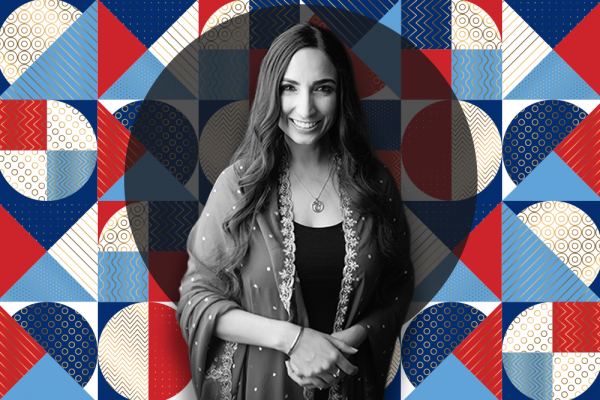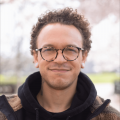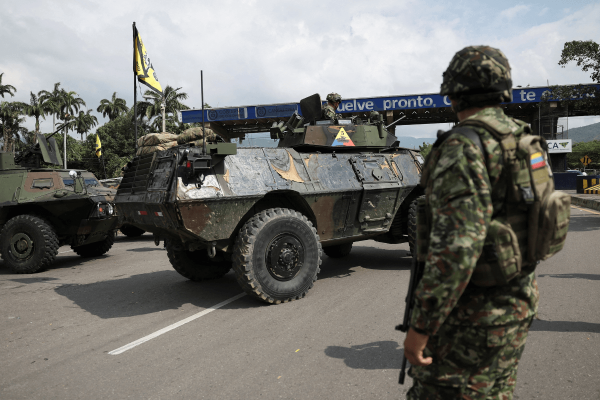On Sept. 15, 2001, Balbir Singh Sodhi, a Sikh man, was killed while he was planting flowers at the gas station he owned in Mesa, Ariz., becoming the first victim of post-9/11 hate crimes. For then-college student Valarie Kaur, the murder of “Balbir Uncle”— as he is known to Kaur and others in the Sikh community — was a pivotal moment. In the months that followed, Kaur drove across the United States documenting anti-Asian, anti-Sikh, and anti-Muslim hate crimes with director Sharat Raju for their 2008 film, Divided We Fall. Since then, Kaur has committed herself to teaching others a “new way of being and seeing that leaves no one outside our circle of care.” Kaur is the founder of The Revolutionary Love Project and author of See No Stranger: A Memoir and Manifesto of Revolutionary Love, based on her own experience, research, and conversations with friends, family, and strangers after 9/11.
Kaur spoke with Sojourners’ Josiah R. Daniels about her book, activism, and the 20th anniversary of 9/11.
This interview has been edited for length and clarity.
Josiah R. Daniels, Sojourners: This year marks 20 years since 9/11. What does that anniversary mean for you?
Valarie Kaur: I’m really seeing this anniversary as a moment for the nation to reckon with its past — with our actions — and start to reimagine the future. Every 9/11 anniversary, it feels as though 9/11 has been weaponized to justify the foreign policies and the acts of aggression our country has maintained and continued for 20 years. And as we’re watching the horror unfold in Afghanistan, I think there is a hunger now to really understand how the world we live in now is shaped by the choices that were made after 9/11 to divide the world into “us” and “them.”
Could you say more about that?
I can trace all the choices that got us here from the immediate hours after 9/11: That night, the president addressed the nation to declare a war on terror. But we cannot grieve and prepare to kill at the same time. There was no space to grieve, to reckon with our vulnerability, to ask the questions of “Why?” and “How do we respond?” Instead, we responded to enormous aggression with enormous aggression that has lasted across four presidencies and continues today.
In your book, you say that Sept. 11 did not cause the violence; Sept. 11 uncovered the violence. What do you mean?
Within minutes of the towers falling, a turbaned, Sikh man was chased in the streets of New York city and called a terrorist — before anyone ever saw an image of [Osama] bin Laden on a television set. We have always been treated as perpetual foreigners in this country.
When my grandfather arrived in 1913, he was incarcerated at Angel Island. It was a time of white nationalist zeal, where they were warning of “a Hindu invasion,” and “a tide of turbans,” and they were finding any reason they could to incarcerate as many as they could. He couldn't become a citizen, he couldn't own land, and there were laws that bar laws that barred him from becoming an equal citizen. It was only through joining with Asian Americans, other immigrant communities, and Black communities that they were able to fight for equal rights in this country by law — but that doesn’t necessarily translate to the human heart.
So, Asian Americans, Muslims, Sikh Americans, in the aftermath of 9/11, we could connect the dots and say, “Actually this is not an aberration; this is a continuation of white supremacist violence in this country.” And then we learn how our particular struggle is part of this larger struggle to dismantle the racial caste system in our society.
What are some tangible ways we can reckon with the legacy of 9/11 this year?
Kaur: We’ve created a 9/11 hub (911hub.org) where we’re inviting people to learn about 9/11’s impact on BIPOC communities, especially Sikh Americans. We are also re-releasing the film I made after 9/11, Divided We Fall, for free, along with new educational guides. And we’re helping plan a memorial at the gas station in Mesa, Ariz., where Balbir Uncle was killed. I’m inviting the country to see this gas station as the second Ground Zero. Balbir Uncle was the first of the countless people whose lives have been lost or shattered by the way our nation reacted to 9/11. The gas station where he was killed is a site of pilgrimage for me and for many in the Sikh community, but the nation as a whole doesn’t see it that way. If we can invite the country to hear Sodhi’s story, it might be the starting point to reckon with the 20 year struggle that so many of our communities have survived.
Why are stories like Sodhi’s are so important?
After 9/11, I stood on a stage and gave people the facts: There are half a million Sikhs in the United States. There has been a demonstrable increase in anti-Muslim hate crimes in the aftermath of 9/11. People would nod politely, but they would not be changed.
But if I stood up on stage and I talked about the kind eyes of this man who would hand out candy to the children who came to the gas station; a man who, when people came to fill up on gas and they didn’t have any money, would let them go; if I told you he was killed while he was planting flowers at his gas station by a man who called himself a patriot; when I tell the story, when I invite people to see what I see and hear what I hear, they begin to feel what I feel.
And if they can feel what I feel — if it gets into their bones, into their body — then they are changed; it becomes theirs, you know? And then it's their story to decide how to act on: How do they now see a turbaned Sikh walking down the street? Do they see him as a foreigner, as a suspect, as a terrorist, or might they see him as an uncle? That’s how we expand our moral imagination.
In your book, you talk about how one of the most important practices of revolutionary love is learning to see all people as part of a oneness, which Sikhs call Ik Onkar. To practice this aspect of revolutionary love leaves a person with no enemies. But is it ever OK to just shake the dust off your sandals and walk away?
This is why my definition of revolutionary love is the choice to labor for others, for our opponents, and for ourselves. At any given season in life, we need to lean into one more than the others.
So, for example, if you are someone who has a knee on your neck right now, it’s not necessarily your role to look up at your opponent and try to wonder about them; your goal is to stay alive, to take the next breath. But if you are someone who is safe enough or brave enough to listen to those kinds of opponents, we need you in that labor. So oftentimes my conversations with audiences who identify as white is inviting them to recognize their privilege, not as a point of shame, but as a point of responsibility. It’s like, “You can do the work that I cannot do right now, either because I’m physically too exhausted to do it or because I’m not safe to do it.”
Many south Asian Americans didn’t have language for vicarious trauma. We have to look to Black and Indigenous women, mothers on this soil, who know what it takes to sustain longevity and resilience, not just over decades, over centuries.
So that’s why I had to go to Audre Lorde and bell hooks. They had the language for me to understand my grief, my trauma, my fatigue, and my rage. I was always led to believe rage was the opposite of love — that I was only as good or polite or spiritual as my ability to choke down my rage. But here comes Audre Lorde saying that rage carries “information and energy.” I began to imagine what it meant to process rage in safe containers and harness that energy for divine rage in the world. Honoring these emotions as part of what it means to stay in the struggle.
You’re Sikh and I’m Christian. What role does religion have to play healing from the wounds of 9/11?
We have heard the call to love from our faith traditions come down to us through the centuries. The task now is to put into practice the call to love that we’ve seen in our scriptures, our songs, and our stories on a scale we never had before; the task now is to model our society around that ethic of love without limit. That’s our task.
Got something to say about what you're reading? We value your feedback!







